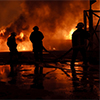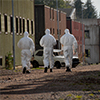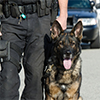Tools & Services for Law Enforcement
Explosives Enforcement
 The Bureau of Alcohol, Tobacco, Firearms and Explosives (ATF) is the Federal agency primarily responsible for administering and enforcing the criminal and regulatory provisions of the Federal laws pertaining to destructive devices (bombs), explosives, and arson. Over nearly 40 years, ATF has developed scientifically proven investigative capabilities, expertise, and resources that have positioned ATF as the Nation’s primary source for explosives and fire investigative knowledge and assistance.
The Bureau of Alcohol, Tobacco, Firearms and Explosives (ATF) is the Federal agency primarily responsible for administering and enforcing the criminal and regulatory provisions of the Federal laws pertaining to destructive devices (bombs), explosives, and arson. Over nearly 40 years, ATF has developed scientifically proven investigative capabilities, expertise, and resources that have positioned ATF as the Nation’s primary source for explosives and fire investigative knowledge and assistance.U.S. Bomb Data Center
 The U.S. Bomb Data Center was established by congressional mandate in 1996 as a national collection center for information on arson and explosives related incidents throughout the United States. The U.S. Bomb Data Center databases incorporates information from various sources such as the Bureau of Alcohol, Tobacco, Firearms and Explosives; the Federal Bureau of Investigation; and the United States Fire Administration. Information maintained by the National Repository is available for statistical analysis and investigative research by scholars and the law enforcement community.
The U.S. Bomb Data Center was established by congressional mandate in 1996 as a national collection center for information on arson and explosives related incidents throughout the United States. The U.S. Bomb Data Center databases incorporates information from various sources such as the Bureau of Alcohol, Tobacco, Firearms and Explosives; the Federal Bureau of Investigation; and the United States Fire Administration. Information maintained by the National Repository is available for statistical analysis and investigative research by scholars and the law enforcement community.Bomb Arson Tracking System (BATS)
 The Bomb Arson Tracking System (BATS) is a web-based case management system which provides you, State and local arson & explosives investigators, access to up-to-date arson and explosives investigative data from across the nation at no charge. Unlike anything you may currently use, it's not just limited to your local jurisdiction or state. BATS provides you access to national arson and explosives incident information.
The Bomb Arson Tracking System (BATS) is a web-based case management system which provides you, State and local arson & explosives investigators, access to up-to-date arson and explosives investigative data from across the nation at no charge. Unlike anything you may currently use, it's not just limited to your local jurisdiction or state. BATS provides you access to national arson and explosives incident information.National Response Team (NRT)
 In 1978, ATF developed a national response capability to help federal, state, and local investigators meet the challenges of significant arson and explosives incidents. This capability, the National Response Team (NRT), can respond anywhere in the United States within 24 hours to assist state and local investigators. ATF has activated the NRT more than 700 times since its inception.
In 1978, ATF developed a national response capability to help federal, state, and local investigators meet the challenges of significant arson and explosives incidents. This capability, the National Response Team (NRT), can respond anywhere in the United States within 24 hours to assist state and local investigators. ATF has activated the NRT more than 700 times since its inception.
International Response Team
 Part of the National Response Team Program, the International Response Team (IRT) is the result of an agreement between ATF and the U.S. Department of State’s Diplomatic Security Service (DSS). The agreement originally allowed ATF to assist in the investigation of select fire and post blast scenes where the DSS has investigative responsibility.
Part of the National Response Team Program, the International Response Team (IRT) is the result of an agreement between ATF and the U.S. Department of State’s Diplomatic Security Service (DSS). The agreement originally allowed ATF to assist in the investigation of select fire and post blast scenes where the DSS has investigative responsibility.
Accelerant and Explosives Detection Canines
 The ATF explosives detection canine, a graduate of ATF’s 10 week explosive detection training program, has been conditioned to detect explosives, explosives residue, and post blast evidence. As a bonus, because of their conditioning to smokeless powder and other explosive fillers, ATF trained explosives detection canines can detect firearms and ammunition hidden in containers and vehicles, on persons and buried underground. With the assistance of support systems such as the National Response Team, Explosives Technology Branch, ATF Laboratories, Certified Explosives Specialists, and the ATF Firearms Branch and Tracing Center, the ATF canine program is producing a viable tool to assist law enforcement with their war on violent crime.
The ATF explosives detection canine, a graduate of ATF’s 10 week explosive detection training program, has been conditioned to detect explosives, explosives residue, and post blast evidence. As a bonus, because of their conditioning to smokeless powder and other explosive fillers, ATF trained explosives detection canines can detect firearms and ammunition hidden in containers and vehicles, on persons and buried underground. With the assistance of support systems such as the National Response Team, Explosives Technology Branch, ATF Laboratories, Certified Explosives Specialists, and the ATF Firearms Branch and Tracing Center, the ATF canine program is producing a viable tool to assist law enforcement with their war on violent crime.
